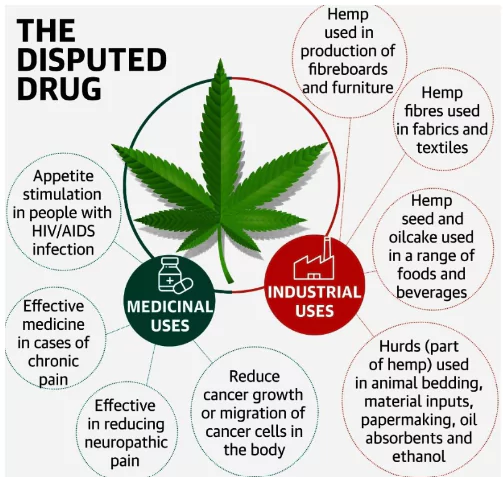Context
Recently, researchers at the University of British Columbia in Canada floated a new clinical trial to examine whether cannabidiol could be used to treat bipolar depression.
Exploring Cannabis (Sativa): A Millennia-Old Herb with Medicinal and Recreational Significance

- It is an herbaceous plant that belongs to the family Cannabinaceae.
- It has been used by humans for over 5,000 years for medicinal and recreational uses, firstly in Central and Northeast Asia and subsequently spreading worldwide.
- Cannabis, or marijuana, is undoubtedly one of the most widely used illicit drugs.
- It has a complex chemical composition that includes cannabinoids which are a group of secondary metabolites, several of which are responsible for the psychotropic effects.
Cultural and Medicinal Significance of Cannabis: Medicinal Marvels in Pain Management and Neurological Conditions
- Reduction in Chronic Pain: Medical marijuana may be able to lessen discomfort and inflammation, particularly in cases of cancer and neuropathic pain.
- Vomiting and nausea: Medicinal cannabis may help avoid or lessen vomiting and nausea brought on by chemotherapy or other drugs.
- Treatment for Epilepsy: Medicinal cannabis may help lessen the frequency and intensity of seizures, particularly in cases of uncommon epilepsy like Lennox-Gastaut syndrome and Dravet syndrome.
- Alzheimer’s disease: By decreasing the accumulation of amyloid plaques in the brain, medical cannabis may help slow down the disease’s progression.
- Multiple sclerosis: Medical marijuana may help lessen the pain, stiffness, and spasms in the muscles that are a part of the disease.
- Crohn’s disease: Abdominal pain, diarrhea, and weight loss are just a few of the symptoms that medical cannabis may help with.
- Glaucoma: Medical marijuana may help reduce intraocular pressure in the eyes, preventing or postponing glaucoma-related visual loss.
Debate on Decriminalizing Cannabis in India
| Arguments against Decriminalizing Cannabis: |
Arguments in favor of Decriminalizing Cannabis: |
- Dependency Issues: Cannabis is categorized as an addictive substance that can lead to dependency problems by the Diagnostic and Statistical Manual of Mental Problems and the International Classification of Diseases.
|
- Abolition of Illicit Trade: The sale of marijuana in India has a sizable underground market. Farmers, retailers, and the government would all benefit from the trade’s legalization or decriminalization as it would create new revenue streams for all.
|
- Symptoms of Withdrawal: Marijuana withdrawal symptoms, such as irritation, difficulty sleeping, and dysphoria, are heavily discussed.
- Just 71% of users who attempt to stop using the substance are successful in doing so.
|
- More affordable and safer than tobacco and alcohol: It is a well-known truth that stoners are more likely to stay calm than alcoholics, who frequently commit violent crimes or reckless driving.
- According to medical research, marijuana may not be as dangerous as alcohol.
|
- Not enough research to make a claim: Extreme forms of epilepsy and multiple sclerosis respond well to marijuana treatment. However, since not enough research has been done to support the assertion, there is still a gap in the knowledge.
|
- Addiction to marijuana is rare: Only 9% developed a clinical dependence on the marijuana. The emergence of an addiction to marijuana may also be prevented by restricted or controlled use.
|
- Abuse of the legislation: In a nation where prescription medications are abused as well, the legalization of cannabis raises significant concerns about its regulation.
|
- Creation of employment opportunities: Following the removal of the unlawful tag, the product would be governed by regulations.
- Manpower and trucks would be needed for its manufacture, processing, transportation, and selling. The same would lead to job creation
|
|
- Increased taxation: ; Since marijuana is being sold illegally, traders charge users exorbitant prices.
- Since the whole transaction takes place on the black market, the money stays in their pockets and never reaches the authorities.
|
News Source: The Hindu
![]() 1 Mar 2024
1 Mar 2024
